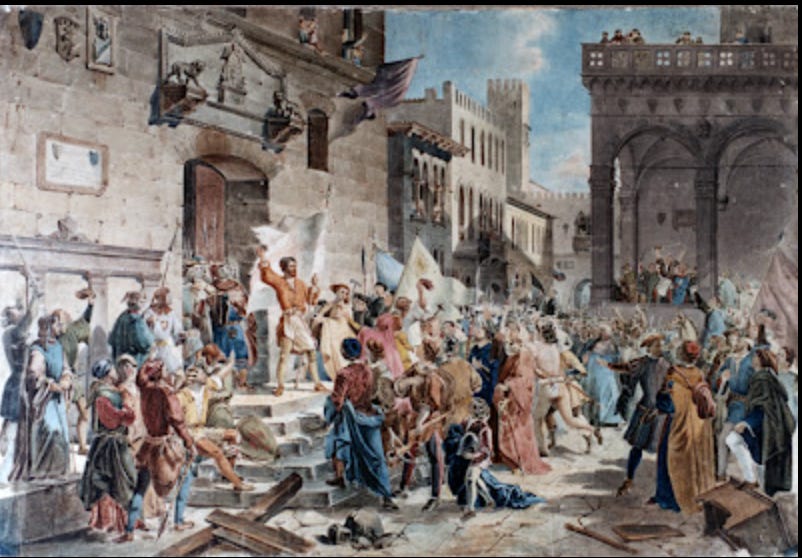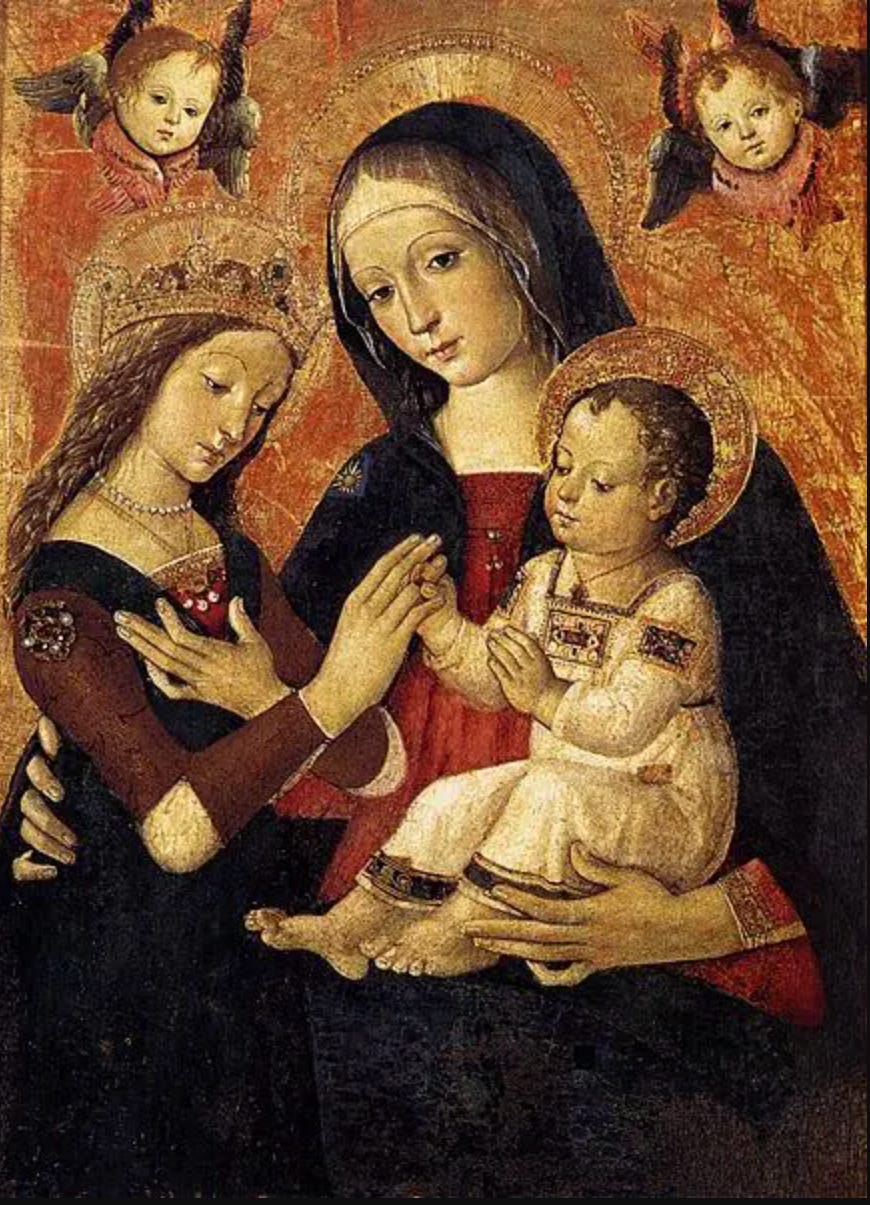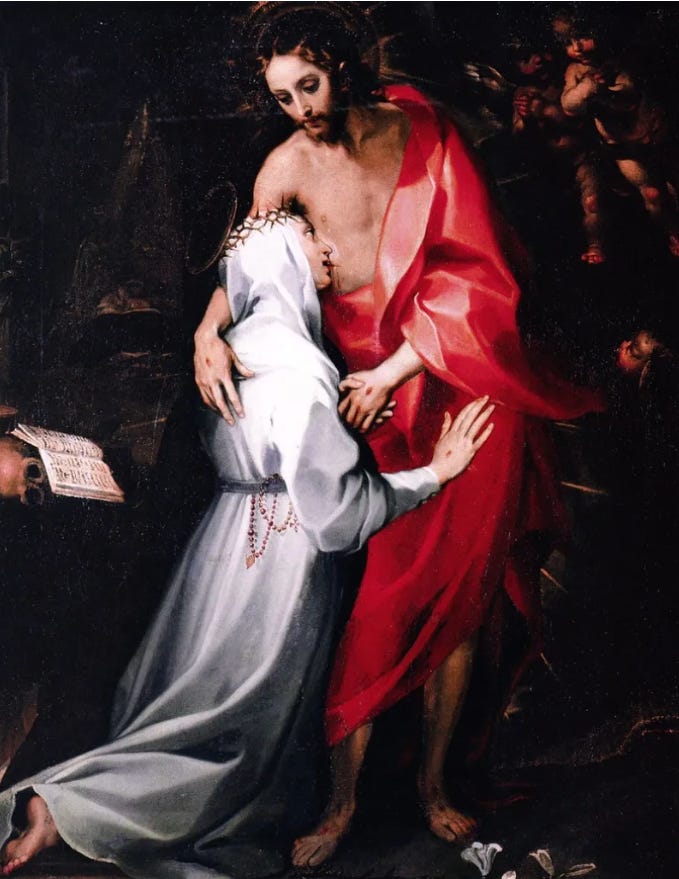The Black Sheep Part 3
Satellites of Satan
In this multi part series I’m sharing a longer essay in chunks throughout the month of June about Saint Caterina, my mother as my first lover, vampires, and the idea of the black sheep. If you missed part 1, click here. For part 2 click here. Thanks for joining me in this. This is really hard to pull together and it is taking a long time.
When this piece is complete I’ll release a craft talk that will focus on techniques of the braided essay. The craft talk is open to paid subscribers and will be released as an audiocast through this platform. Upgrade to paid.
Suppose your sister has terminal cancer and her daughter asks that you wear a mask on the plane or wear a mask around her, and you and your other sister, and your evangelical husbands decide to just zoom instead. We don’t want to give her any germs. But then tell your children that you couldn’t go because you were made to feel unwelcome.
Suppose one sister says to the other:
“I’m far right.”
“But far right is racist and—”
“How can you say that? I’m not racist.”
“So how do you think about me?” This sister asks and there is an enormous vulnerability and history woven into this phrase: to be the gay family member of a generationally gay family who didn’t publicly come out, who lived quietly with her partner and called her a friend, who did everything she could to hold onto her family.
“I don’t mind you. You’re different. You don’t throw it in my face.”
Suppose this can be a slap in the face. Which cheek do you turn?
If you don’t get it by now, I find it dangerous to see oneself as the black sheep. Abusers see themselves as the black sheep more often than the actual black sheep do.
Saints are often black sheep and agents of colonization, especially the patron saints of my family.
My mom’s family was from southern Italy, sharecroppers in a mountain town that overlooked the Tyrrhenian Sea, south of Salerno, called Gioi Cilento. My mom’s family prayed to Saint Anthony—a colonizer from Spain. My dad’s family were Jewish laborers from a town North of Pisa called Lucca and it is this Grandma that I’m named for, Corinna, and her Saint, Caterina di Siena that compels me.
Corinna died decades before I was born but I have read the letters her family wrote to her. One half Catholic and one half Jewish, how during World War II her family members hid in the mountains while the Nazi’s invaded and stole everything even their underwear. From these letters I know that the family disagreed with her son Dominic, my great Uncle, becoming a soldier “Because war needlessly kills people.” Most letters said the same thing: thank you for the money but when are you coming home?
The holy metal she wore is rubbed nearly smooth, Caterina’s face is gone and only the outline of her praying form remains. I think of Corinna reading these letters and rubbing this metal the way I once rubbed that Holy Spirit cross.
Caterina de Siena was born in 1347 and down the streets the Flagellates marched with their self inflected horror and haunting dress but perhaps that was not as horrifying as the swiftness and brutality that the black plague took down victims, or the group raping of women in the streets, the victims often pulled from their homes. The fascist state that didn’t end with Rome continued in each of these small kingdoms or provinces that we now call Italy and it wasn’t uncommon to be publicly put to death for speaking disparaging remarks about a Government official or the Gentry. Perhaps what made you unclean or kept you outside the city gates was deserved and was a mark of your uncleanness, your sin, whatever you brought upon yourself.
The Mantellate, were a lay group of women who, though not exactly Nuns, had committed their celibacy to Christ, spiritual fulfillment was meant to be a painful one. They found pain to be a way of “melding their humanity with their savior’s humanity.” (Shelly Emling, Setting the World on Fire).
Caterina begged her family to let her join them.
After my Visual Artist exits my life I press my hand against my throat and imagine it’s his hand. With a much later lover, who I will refer to as The Carpenter but not for want of Jesus, I would try to drink my coffee at the same time that I knew he was drinking his coffee some hundreds of miles away and let out an approximation of the pleased sigh that he let out. He had beautiful tattoos on the side of each hand and though I don’t get the same image, I point to that spot to the tattoo artist and try to imagine what he felt and still, stare at the sides of my hands and think of him.
In the Medieval Era, according to Suzanne Nofke “the more you were like Jesus in his sufferings, the holier you were and the better.”
And Caterina, after her first visit from Jesus craved maltreatment, she wanted to pay for her sins and like Jesus she wanted to pay for the sins of others. Even if that bodily work would technically be redundant by evangelical standards.
Two of my aunts are Born Again, shedding the Catholic childhood that marks many Italian Americans. One led the other into it and this rift was a constant source of tension. Grandma liked being Catholic and my favorite aunt and my mom didn’t like the rule that other cultures and religions weren’t valid in the face of a Christian faith that deemed you are only saved by Jesus, even though those two also recited during Mass “I believe in the one holy Catholic and Apostolic Church”, even if in pidgin Greek the word used in the Gospel, ekklesia, simply means gathering so could be anything, though in these early days of the cult of Christ it often took place at a woman’s house.
The Born Again aunts and their children brought the fear of hell. My cousins described the torture and suffering to me. That the devil was everywhere. That even my blue eyes, which, until my nieces were born, were a genetic anomaly in my family, and, according to a particularly cruel cousin, was said to be the mark of the devil. Under their vision and passion for Jesus the thought of his body became even more terrifying to me. One morning, upon receiving our Easter baskets this cousin pressed her nose to the glittery shredded plastic hay and declared, “I can smell Jesus.”
We would be with this cousin and her family every year for Easter and so I would go to church with them because I wanted to have time with my cousin, because I wanted to be seen as different from my Mom, who didn’t like to go.
I remember the preacher at my aunt’s church who carried the cross for Jesus theatrically up the aisle. And as he did he explained the horrors of the cross. And how this was meant to move us and it did move me because my hand went in the air to accept Jesus in my heart. There was a crushing feeling in my chest (a nod toward the crushing weight on the lungs at the moment of death in crucifixion) and my aunt said “Well I feel like I’ve been to CHURCH.”
According to some Catholics and to Christians, Jesus is the last of the prophets. There is no room for anyone else to emerge UNLESS this person is a mystic in service to him or rather to whatever these European notions of his Church became.
Like the pastor my Born Again aunt posted on Facebook in 2016, who said Jesus came to him and said to bring forth a return to Christ, Christians had to play the “Trump card”.
Christians reclaimed the cross but it did not become an object of defiance against brutal state oppression but a warning against other people’s doom. I will not go to hell but you will and your hell is the hell that was experienced on the cross but with no relief ever. Or, the burning cross, meant to threaten and terrify: our God says we can do what we want with you. Not much different from the Romans.
In the time of Caterina de Siena it was illegal not to work, illegal to beg, illegal to give bread or alms to the poor or offer refuge. This was left to the work of the saints and some people of religious order, but even in these actions there was the risk of being seen as a heretic or a witch. In an incredible moment of revolt in Florence—an area that Caterina was in contact with in an attempt to bring the ex communicated city back into the fold of the Church despite their refusal to pay taxes to the papacy—the working peasants, Ciompi, who were cloth makers, demanded a share of government and a moratorium on all debts incurred. They called themselves “God’s people” and they were not into Caterina.
Caterina, who wore Christ’s foreskin around her finger, Caterina, who it was said, drank Jesus’s blood straight from the hole Thomas put his fingers in, this Caterina who negotiated with the warring Popes, who asked the warring factions of the Church to focus their anger on the Moors and invade, invade, instead of each other. These workers, Ciompi, God’s people, called Caterina STREGA, “The Witch”.
A mistake, to make a black sheep feel more like a black sheep, because she gave them a name too, The Satellites of Satan.
God’s people, or Satan’s satellites, but let’s call them the working class, stormed where Caterina was staying. She was ecstatic. What she wanted more than anything was to be martyred and returned to Christ’s body—she called this the red rose, rather than the white rose of virginity.
“Do to me whatever our Lord may permit but in the name of the Almighty I command you to harm none of my companions.”
They were confused by this perhaps because it struck their humanity, as it struck Pilat’s humanity when the activists seemed so willing to be killed. They took their leave.
“Oh what a disappointment,” she cried out and blamed her sins for lack of her body’s destruction.
What were her sins? She whipped herself for them during the years she lived in her tiny tomb of a room, sleeping on just wood slats and a stone for a pillow, before her mystical marriage and Jesus’s command that she work amongst the people. She ate and drank only her weekly communion, and orgasmed wildly after.
Women who were mystics in the Catholic Church were assigned a kind of companion, a spiritual director, who kept continual watch and guidance over them to make sure that their visions were in line with church rule on these matters. Raymond of Capua was assigned to Caterina. He wrote about how Caterina would cajole Raymond’s sins from him and he would often be left sobbing in humility and repentance. Caterina could smell sin on people just as she could smell the beauty in their soul.
I have a highly attuned nose for trash and cat pee. My mom said she could always smell if someone had sex. When she told me this, as an adolescent, I couldn’t imagine what she meant because I had no idea yet that sex had a smell.
But now, I love the smell that fills a room after sex and I think of my mom when my lover washes her hands or face after we are done. Or her playful concern once, when she went outside in her bathroom to get the paper—she hadn’t washed her hands yet—and she was met by an Amazon attendant. They didn’t touch except the proximity that their hands were to each other as she took the package from his.
“I was like, don’t smell too deep,” she joked to me when she came back in. I was offended.
“He should be so lucky,” I said.
I don’t think my mom thought herself lucky to smell fucking on other people but something more like judgment, a shaming of this thing they thought was private but was fully public to her.
However, when you die, when you are dying, there is a smell, and the male hospice nurse can wipe you down—how could it be that you had to have a male nurse at the end of your life—but the smell is still there, and you can’t control it. But everyone who walks into the apartment knows, and you finally can’t deny, that you are a body and that you are rotting.
End of Part 3 but more to come! I promise this will come to some conclusion soon, even if I promise that mostly for myself. If you read this far THANK YOU and let me know.






I hope it doesn't come to an end soon. I love your writing. Mobius strip feeling public, private. "God’s people, or Satan’s satellites, but let’s call them the working class, stormed where Caterina was staying. She was ecstatic."